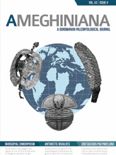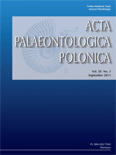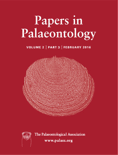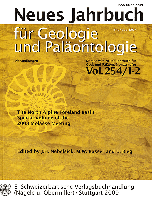
Palaeobiodiversity and Palaeoenvironments
metrics 2024
Advancing Knowledge of Ecosystems Through Time.
Introduction
Palaeobiodiversity and Palaeoenvironments, published by SPRINGER HEIDELBERG, is a distinguished academic journal that focuses on the intricate intersections of paleontology, ecology, and geology. With a strong commitment to advancing research in these fields, the journal maintains a notable impact factor and successfully ranks in the second quartile (Q2) in renowned categories including Ecology, Evolution, Behavior and Systematics, and Geology, providing significant visibility to contemporary research endeavors. Spanning a publication timeline from 2010 to 2024 and indexed under the respected Scopus database, it features a diverse array of articles that address the complexities of past biodiversity and ecosystems. Positioned within Germany's vibrant academic landscape, this journal appeals to a broad readership of researchers, professionals, and students who are eager to uncover the historical narratives of our planet’s life forms and their environments.
Metrics 2024
 0.51
0.51 1.40
1.40 1.30
1.30 38
38Metrics History
Rank 2024
Scopus
IF (Web Of Science)
JCI (Web Of Science)
Quartile History
Similar Journals

Depositional Record
Pioneering research at the intersection of geology and environmental science.Depositional Record, published by WILEY, stands as a vital resource for researchers and professionals in the fields of Geology, Paleontology, Oceanography, and Environmental Science. Since its inception in 2015, this Open Access journal has been dedicated to advancing the understanding of sedimentary processes, depositional environments, and their implications on Earth's history and contemporary climate dynamics. With an impressive array of categorizations, including Q1 rankings in Geology, Paleontology, and Stratigraphy, it underscores its significant contribution to these scientific arenas. The journal’s reach is reflected in its Scopus rankings, placing it within the top quartiles in multiple categories, indicating the high quality and impact of its published research. Researchers, students, and professionals who engage with Depositional Record will find a treasure trove of knowledge aimed at informing best practices, innovative studies, and fostering an interdisciplinary dialogue crucial for environmental stewardship and geological exploration.

AMEGHINIANA
Charting the Course of Life Through TimeAMEGHINIANA is a distinguished academic journal published by the ASOCIACION PALEONTOLOGICA ARGENTINA, serving as a vital platform for the dissemination of cutting-edge research in the fields of Ecology, Evolution, Behavior and Systematics, as well as Paleontology. With its ISSN 0002-7014 and E-ISSN 1851-8044, the journal has established itself as a key reference point for scholars seeking to explore the intricate relationships within ecological systems and the evolutionary history of species. Despite not offering open access, AMEGHINIANA maintains a reputation bolstered by a Q3 ranking in both its subject categories, underlining its sustained commitment to enhancing scientific knowledge. Researchers and professionals alike benefit from this journal’s extensive archive of studies dating back to 1985, with ongoing contributions expected until 2024. With a focus on high-quality content, this journal is essential for anyone immersed in the study of paleobiology and ecological systems.

NAUTILUS
Navigating the Frontiers of Aquatic DiscoveryNAUTILUS is a distinguished journal published by the Bailey-Matthews Shell Museum, dedicated to advancing the understanding of aquatic sciences as well as ecology, evolution, behavior, and systematics. With an ISSN of 0028-1344, NAUTILUS has played a significant role in the scholarly community from its inception, with publication converged between 1996 to 2015 and 2017 to 2024. Although currently categorized as Q4 in Aquatic Science and Ecology, Evolution, Behavior and Systematics for 2023, the journal has a reputation for publishing high-quality research that contributes to the broader scientific discourse. Researchers and students alike can benefit from the insights provided by NAUTILUS, which remains committed to exploring the intricate relationships within aquatic ecosystems. Its editorial management, led by Dr. José H. Leal, ensures rigorous peer review and academic excellence, making it a crucial resource for those dedicated to discovering the complexities of aquatic and ecological research.

PALAEONTOLOGIA ELECTRONICA
Connecting Researchers to the Rich Tapestry of Earth's HistoryPALAEONTOLOGIA ELECTRONICA is a distinguished open-access journal published by COQUINA PRESS, offering a vital platform for the dissemination of cutting-edge research in the fields of Paleontology and Oceanography. Launched in 1998, this journal has continuously fostered scholarly communication, allowing unrestricted access to scientific findings and contributing significantly to the advancement of the field. With an impressive track record since its inception, PALAEONTOLOGIA ELECTRONICA holds a 2023 Scopus ranking of #39 out of 113 in the Paleontology category, demonstrating its value among academic resources as evidenced by its Q2 quartile ranking. The journal is based in the United States, and it encourages submissions that span a diverse range of topics, from fossil analysis to evolutionary biology. As a prominent resource for researchers, educators, and students alike, it plays a crucial role in shaping the future of paleontological study.

JOURNAL OF THE PALAEONTOLOGICAL SOCIETY OF INDIA
Illuminating the Fossil Record with Scholarly ExcellenceThe JOURNAL OF THE PALAEONTOLOGICAL SOCIETY OF INDIA, published by SAGE PUBLICATIONS INDIA PVT LTD, stands as a significant resource in the field of paleontology, dedicated to disseminating high-quality research and findings from the Indian subcontinent and globally. With an ISSN of 0552-9360, this journal has established itself within the academic community, particularly as it converges its publication years from 2011 to 2024. Ranking in the Q4 category of paleontology as of 2023, it serves an essential niche for researchers and students interested in the historical biological records and evolutionary processes. Despite its current Scopus ranking of #88 out of 113 in the Earth and Planetary Sciences category, the journal plays a pivotal role in fostering scholarly dialogue and advancing the understanding of paleontological sciences in India and beyond. Researchers are encouraged to contribute to this evolving field and share their findings, solidifying the journal's commitment to highlighting significant paleontological research contributions.

Palaeoworld
Illuminating the Path of Evolution Through Rigorous ResearchPalaeoworld is a leading peer-reviewed journal published by ELSEVIER, focusing on the dynamic and interdisciplinary fields of paleontology, ecology, and stratigraphy. Established in 2006, the journal aims to facilitate the dissemination of innovative research and significant discoveries that enhance our understanding of past life on Earth. With an impressive impact factor and categorized in the second quartile (Q2) for Ecology, Evolution, Behavior and Systematics, Paleontology, and Stratigraphy in 2023, Palaeoworld stands out in its commitment to high-quality scholarship. The journal is indexed in Scopus, ranking #23 in Paleontology and #14 in Stratigraphy, placing it within the top 20% of publications in these categories. As a valuable resource for researchers, professionals, and students alike, it provides unrestricted access to cutting-edge findings, detailed methodologies, and critical assessments of paleo-environmental data. This journal is not only a repository of knowledge but also a platform for advancing discussions that bridge past ecological patterns with contemporary issues.

ACTA PALAEONTOLOGICA POLONICA
Bridging the Past and Present of Life on EarthACTA PALAEONTOLOGICA POLONICA is a leading scholarly journal in the field of paleontology, published by the Institute of Paleobiology, Polish Academy of Sciences. With its open access model established since 1956, the journal ensures that vital research related to Earth's history and the evolution of life is freely accessible to a global audience. Based in Warsaw, Poland, this journal has garnered a respectable impact within the academic community, currently positioned in the Q2 quartile of its field and ranking #47 out of 113 in Scopus for Earth and Planetary Sciences, reflecting its significance in advancing paleontological research. Covering a wide range of topics related to fossil studies and evolutionary biology, ACTA PALAEONTOLOGICA POLONICA serves as a crucial platform for researchers, professionals, and students alike, encouraging the dissemination of innovative ideas and discussions that contribute to our understanding of past life on Earth. As it continues to publish high-quality articles through to 2024 and beyond, this journal remains integral to the ongoing discourse in paleontological sciences.

Papers in Palaeontology
Diving into the Diversity of Life Through TimePapers in Palaeontology, published by WILEY, is a premier academic journal dedicated to advancing the field of paleontology. With an admirable impact factor and positioned within the Q1 category in Paleontology for 2023, this journal has established itself as a leading platform for innovative research and discussion, ranking 17th out of 113 in Scopus’s Earth and Planetary Sciences category. Since its inception in 2015, Papers in Palaeontology has aimed to publish high-quality, peer-reviewed articles that explore the diversity of ancient life forms and their evolutionary history. Researchers, professionals, and students alike will find valuable insights and rigorous analyses that contribute to the understanding of our planet’s past. Although Open Access options are not available, the journal provides a wealth of knowledge essential for anyone engaged in the study or practice of paleontology, solidifying its importance in shaping future academic discourse.

NEUES JAHRBUCH FUR GEOLOGIE UND PALAONTOLOGIE-ABHANDLUNGEN
Unearthing Insights from the PastNEUES JAHRBUCH FUR GEOLOGIE UND PALAONTOLOGIE-ABHANDLUNGEN, published by E SCHWEIZERBARTSCHE VERLAGSBUCHHANDLUNG, is a distinguished scholarly journal based in Germany that has made significant contributions to the field of Earth and Planetary Sciences with a particular emphasis on Paleontology. With its ISSN: 0077-7749, this journal provides an essential platform for researchers, professionals, and students to explore cutting-edge research and developments that enhance our understanding of geological and paleontological processes. Boasting a robust ranking of #67 out of 113 in Scopus for the category of Earth and Planetary Sciences and achieving a Q3 quartile ranking in Paleontology, it stands as a significant resource in the global academic community. Though not an open-access journal, it offers valuable insights from 1987 onwards, ensuring a comprehensive archive of high-quality research articles published from 1995 to 2024. Its scholarly impact continues to resonate, making it a vital reference point for advancements in the ever-evolving disciplines of geology and paleontology.

PALEONTOLOGICAL JOURNAL
Unlocking the Mysteries of Our Planet’s History.The PALEONTOLOGICAL JOURNAL, published by PLEIADES PUBLISHING INC, is a premier platform for the dissemination of research in the field of paleontology. With an ISSN of 0031-0301 and E-ISSN 1555-6174, this journal serves the academic community by providing insights into fossil studies, evolutionary biology, and the historical narrative of life on Earth. Despite being categorized in the Q3 quartile for 2023 and currently holding a Scopus rank of #84 out of 113 in the Earth and Planetary Sciences- Paleontology category, it remains a valuable resource for researchers and practitioners. The journal's coverage spans from 1990 to 2024, offering a comprehensive historical perspective while also addressing contemporary issues in paleological research. Scholars and students alike benefit from its rigorous peer-reviewed articles and the opportunity to access vital knowledge in the ever-evolving field of paleontology.